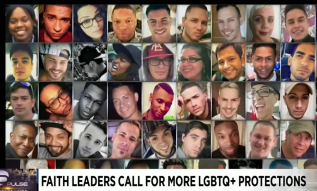Main|Bio|Books|USA Today columns|Opeds|Boston.com blog|Media|Other Publications| Speaking|Links
 June 10, 2021
June 10, 2021
Commentary
Pulse shootings' lingering trauma must be public-health priority
Commentary
By SARAH C. PECK AND JAMES ALAN FOX
GUEST COLUMNIST |JUN 10, 2021 AT
5:30 AM
June 12 marks five years since the horrific mass shooting at
Orlando's Pulse Nightclub - the second deadliest incident of its kind in
U.S. history. Gov. Ron DeSantis declared the day "Pulse Remembrance Day" in
honor of the 49 killed in the massacre, but then eliminated nearly $1
million from a budget funding programs supporting the LGBTQ+ community.

Included in the cut was the state's share of the funding for the Orlando
United Assistance Center, which Mayor Buddy Dyer established in the
aftermath of the shooting to provide support for the grieving families and
survivors of the attack who continue to struggle with both physical and
emotional scars.
Research shows that mass shootings exert a
psychological toll on their direct victims and members of the communities in
which they took place. The National Center for PTSD has estimated that 28%
of people who witness a mass shooting will suffer from post-traumatic stress
disorder; another 33% will experience a stress disorder. Initial reactions
to trauma can include exhaustion, confusion, sadness and numbness. More
severe responses include sleep disorders, depression, anxiety and substance
abuse. These mental-health impacts often last for years and impose
significant costs on the society.
For these reasons, the
law-enforcement response is just the first step in the enormous, costly
response to a public mass shooting. Once security is restored, it falls on
our elected officials to help communities recover from trauma. In the
aftermath of recent mass shootings in Atlanta, Boulder, Indianapolis and San
Jose, policymakers at all levels of government need to recognize and respond
to the devastating and long-lasting impact of such events. Funding for
mental health services for victims, first responders, and communities
affected by these tragedies is urgently needed.
Dyer's
trauma-informed efforts to meet the mental-health needs of the Pulse
survivors should be seen as a national model. Within hours of the shooting,
the mayor's office directed families and friends to a reunification center
to await news of their loved ones.
Recognizing the needs of survivors
and family members would be significant, Dyer met with representatives of
the American Red Cross and FBI Victims Services Division to plan a Family
Assistance Center (FAC). The FAC, established just days after the shooting,
mobilized over 35 local organizations to provide services to 900 individuals
ranging from psychological first-aid to legal aid, travel services,
childcare, and funeral services. The FAC also offered hot meals and a quiet,
secure place for family members to grieve away from the press.
The
Orlando United Assistance Center (OUAC) opened two weeks later to provide
ongoing support to survivors and family members as the FAC closed.
Most survivors of a public mass shooting show resilience over time. But
others experience ongoing mental-health problems. Experts say that providing
a place for collective healing does the most to strengthen families and
communities during the recovery phase. That's why support for the OUAC is so
critical.
For the past five years, the OUAC has offered a safe place
for those affected by the Pulse shooting. The OUAC staffs victim advocates
with access to a diverse network of mental-health providers across Central
Florida to assist survivors with their recovery needs. In addition,
advocates provide referrals for housing assistance, emergency financial
assistance, employment, training, and educational opportunities. The OUAC
has been a godsend to the Pulse survivors, but its services are in jeopardy
after federal support ended.
Each year since the Pulse massacre,
hundreds of thousands make the pilgrimage to the nondescript, gray building
in Orlando where the shooting took place. This year, their tears and prayers
need to be answered by a commitment from the state of Florida to fully fund
the OUAC for the Pulse survivors and their families until its services are
no longer needed.
Sarah C. Peck is director of
#UnitedOnGuns, an initiative of the Public Health Advocacy Institute at
Northeastern University School of Law. James Alan Fox is the Lipman
Professor of Criminology, Law and Public Policy also at Northeastern
University.